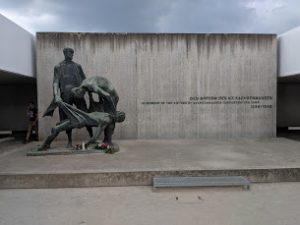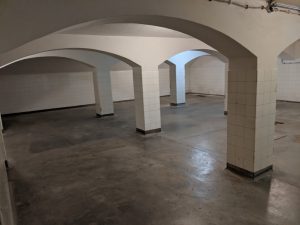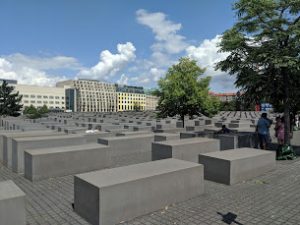Visiting Sachsenhausen was an eye opening experience. I’d always learned about the holocaust in school, but shear extent of the organization and planning required never really hit home. Despite having general knowledge about concentration camps, after visiting Sachsenhausen the infrastructure in place was downright shocking. From the roads to the walls to the buildings themselves- everything was designed for mass production and efficiency.
Tag: blogQ3
Sachsenhausen and Holocaust Museum Reflections
I thought that I was prepared to visit Sachsenhausen.
I was not.
Continue reading “Sachsenhausen and Holocaust Museum Reflections”
Sachsenhausen and Holocaust Museum Reflection
Visiting Sachsenhausen was unexpectedly difficult. I have known of many stories and the general history of the concentration camps and knew it would be difficult but seeing the actual locations and listening to the audio tour really hit deep. The hardest part was hearing about how proud the engineers behind the camp were of their design and creation. As someone studying engineering it was painful to hear of people with the same career doing something so inhumane. The head designer was so proud of the efficiency of his equilateral triangle camp. The rain and thunder at Sachsenhausen felt quite fitting to the dark mood of the camp.

I was surprised to learn that the concentration camp did not fully close after WWII as the Russians turned the camp to imprison the previous Nazi captors. There were other surprising things, most horrible but not all. I was happy to hear an account of the band that played in the morgue and how much joy it brought to the captives there.

In relation to the vileness of Sachsenhausen, I preferred the somber and reflective nature of the Holocaust museum. I felt less powerless as the museum encouraged me to remember and reflect on the horribleness so that it will never happen again. It was still unbelievably hard to read all the testimonials, history, and tales of family’s torn apart and slaughtered.

Even writing this post a week later is hard. I feel like I cannot properly describe the sense of devastation and cruelty visible at the museums. I don’t believe I will ever forget some of the instruments and methods I saw and learned about there. Despite the hardness of all I saw and learned, I am glad I learned it and hope to stay mindful of it throughout my future.
Sachsenhausen Camp and Memorial To Europe’s Murdered Jews
What was most disturbing to me about Sachsenhausen and The Holocaust Memorial was not the sheer extent of the human depravity that made the systematic murder of so many people possible. It was not the fact that within a few years, about six million people were killed. It was not the glee with which Nazi officials carried out their atrocities and indifference with which some other Germans watched . What disturbed me most is how closely the rhetoric in the years preceding the official beginning of systematic murder so closely resembles the rhetoric I see in the world today.
This time, “Jewry equals crime” has been substituted by “Immigrants equals crime,” and anti-Jewish rumblings have been replaced by anti -Semitic carnival floats in Belgium and white supremacist parades in the United States.
I can only hope for the best: that what happened then will not happen again. However, it would be foolish of me to say it could never happen again.
Sachsenhausen & Holocaust Museum
Back in Middle School, the Holocaust was my first exposure to the worst of humanity. From an early age, it’s easy to view the world as morally black and white with most entertainment and courses emphasizing the good. Upon truly learning about the holocaust really changed my outlook on the true extent humanity can go to sustain a flawed ideology.
Reflection on Sachsenhausen and the Holocaust Memorial
Visiting the Sachsenhausen Concentration camp and the Holocaust museum were eye-opening experiences to me. I thought I knew the sorrowful history of WWII and the persecution on Jews, but it was worse than I thought.
Continue reading “Reflection on Sachsenhausen and the Holocaust Memorial”
Holocaust Memorials
The visits to the Sachsenhausen Concentration camp as well as the holocaust museum were grim reminders of what humanity can be like at its worst. One of the things that stuck out to me was the extent and the lengths gone to strip away the humanity and individuality of everyone victimized.
Reflection on WW2 memorials
This past weekend our group visited both the concentration camp Sachsenhausen and the memorial/museum for the murdered Jews.
Q3 Reflections on Sachsenhausen and the Holocaust Memorial
Visiting Sachsenhausen and the Holocaust Memorial in Berlin were experiences that brought into context the terrors experienced in WWII by the Jewish people living in Germany, that suffered so greatly under their systematic targeting and the Holocaust. Understanding how Germany has responded to the Holocaust helps us realise that dialogue and education are key to helping reconcile the events of the past and prevent history from repeating itself.
Continue reading “Q3 Reflections on Sachsenhausen and the Holocaust Memorial”
Sachsenhausen
Going through school we have studied WW2 many times. Going through an actual camp brought everything we had been taught life. Continue reading “Sachsenhausen”